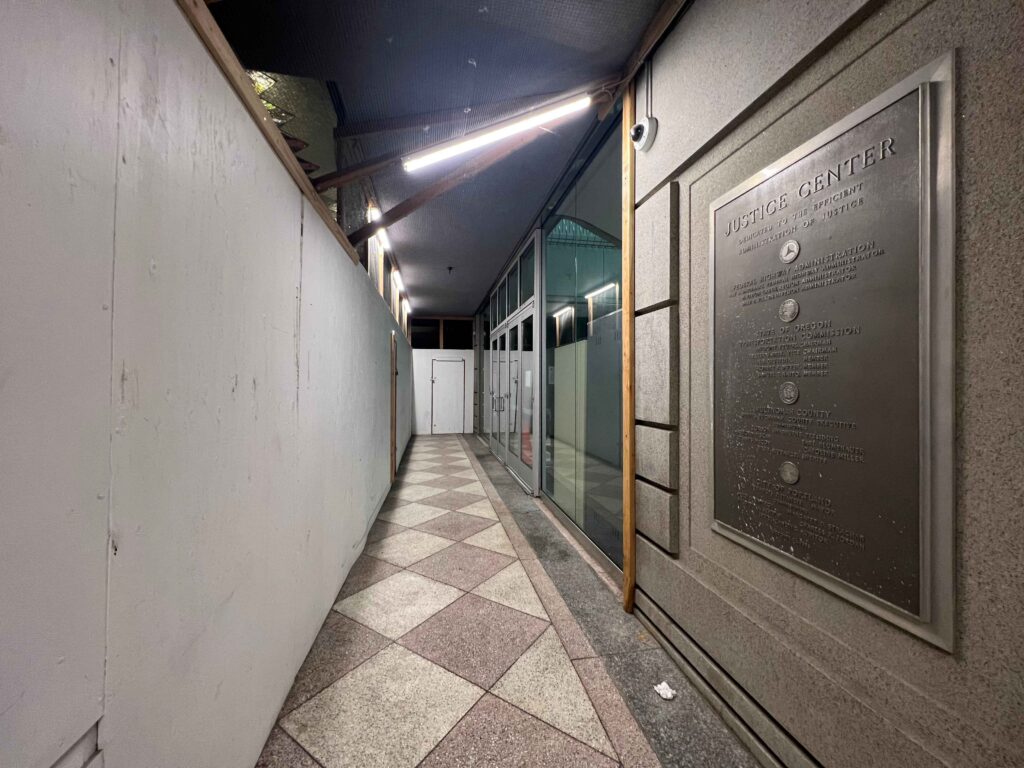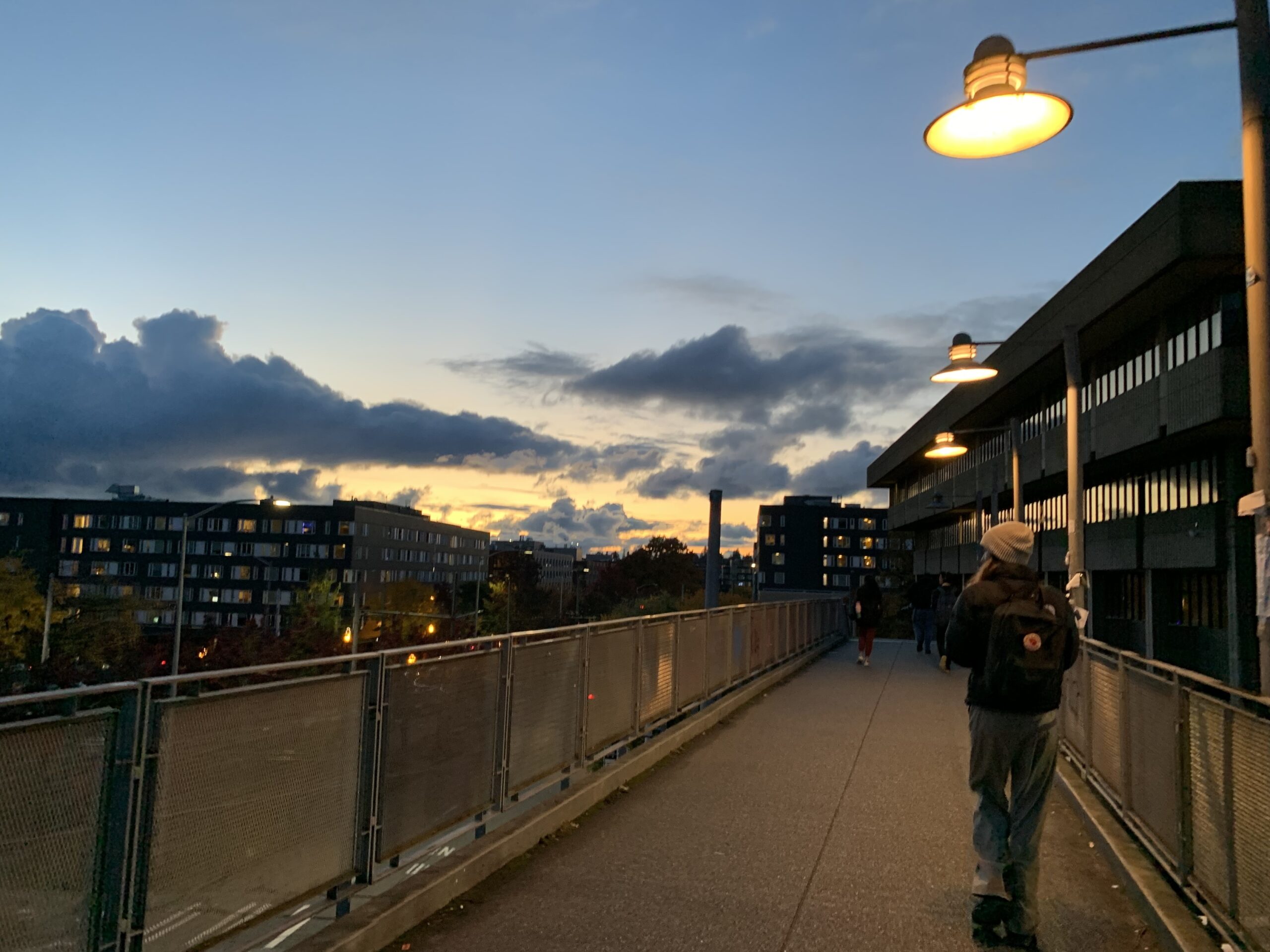(PORTLAND) — Failure to appear in court is never a good look. But for people experiencing homelessness, it’s not that simple.
This was one of many issues Judge Erin Kirkwood dealt with on Oct. 26 as she presided over Courtroom Four in Multnomah County’s Justice Center for a routine series of misdemeanor arraignments.
The reason cited most often for a defendant’s failure to appear in court was their lack of housing. The general response was a request for release from the Justice Center, where several of the accused individuals were being held, so all efforts could be made to ascertain housing in the meantime. But with many people successfully appearing virtually in court via Webex, the criminal justice system grapples with whether or not homelessness is a valid excuse for not appearing in court.
One woman who had failed to appear in the past, Emily Dawn Sands, said it was due to homelessness. She told Misdemeanor Attorney Virginia Sorrell Mulroy during her arraignment that she could already be in an apartment if not for the legal process causing her to miss a housing appointment. “They prevented me from having that,” Sands said.
‘Everything has been stolen from me’
However, charged with two Misdemeanor Class C charges; one count of theft in the third degree, and one count of criminal trespass in the second degree, as well as two Misdemeanor Class A charges; one count of theft in the second degree and unlawful possession of methamphetamine, Sands appears to have bigger problems at hand.
But standing behind the plexiglass wall beside Sorrell of Multnomah Defenders Inc., her tears told a different story. Ombre dirty blonde hair gelled up into a mohawk and eyes to the floor, she attempted to conceal her emotion, “Everything has been stolen from me multiple times. There’s no way I could have made it to anything without a safe place to live.”
Clad in a pink long-sleeve shirt marked “jail” beneath a dusty blue uniform reminiscent of a doctor’s scrubs, she implored others to understand that with nothing, she could do nothing.
Law student Sarah Johnson from the district attorney’s office told Judge Kirkwood that based on Sands’ failure to appear in court previously and new criminal activity, the defendant scored a 6/6 in likelihood to re-offend. Sorrell requested release for Sands, but Kirkwood hesitated.
“She has been released on her own recognizance before, and has not been successful in returning to court.” Despite that, she said, “I am going to give her a shot at supervised release.” Sands was ordered to report immediately to Close Street Supervision, a program that Willamette Week reports the Multnomah County Sheriff’s office runs to keep an eye on released defendants before trial.
Sands’ case was only one of several that day citing homelessness as a reason for previously failing to appear in court. Mitchell Keith, held on two counts of theft in the second degree, said his past failures were also due to his lack of housing. However, he said that he had recently received a housing opportunity, and wished to be released as he could now reliably appear.
Kirkwood, however, did not oblige, noting that of the four previous times Keith had been released, none had yielded a willing return to court. “I don’t believe conditional release will be effective.”
‘I can’t even get what you’re saying’
Many of the other arraignees who appeared on Oct. 26 elected to call into their appointments via Webex, begging the question, is homelessness an excuse for not appearing in court? Christopher Cornelius Hooker is one example. Charged with three Class A Misdemeanors related to domestic violence, he never actually showed his face.
Staring at a gray screen with his blurred-out phone number, those in the courtroom listened as Hooker received a no-contact order for the woman he was charged with assaulting. “Your connection with us is terrible,” said Kirkwood, “I can’t even get what you’re saying.” Despite garbled words and jarring thumping sounds, Hooker was able to fulfill his “appearance” at the arraignment.
In a day and age where seemingly everyone has a cell phone and many locations offer public wifi, is there any excuse to not attend court? A study from the National Institute of Health shows that 85% of people surveyed experiencing homelessness use a cell phone every day.
One doesn’t even need a smartphone to call into a court hearing- an audio-only device will suffice.
But when it comes to issues as sensitive as homelessness, there’s no simple answer. If the justice system lets people go, it’s with the knowledge they may never come back. County resources would be spent either way, whether holding them or finding them if they don’t appear in court.


